Steps to Statehood Timeline
1896: Theodor Herzl's publication of Der Judenstaat ("The Jewish State") is widely considered the foundational event of modern Zionism.
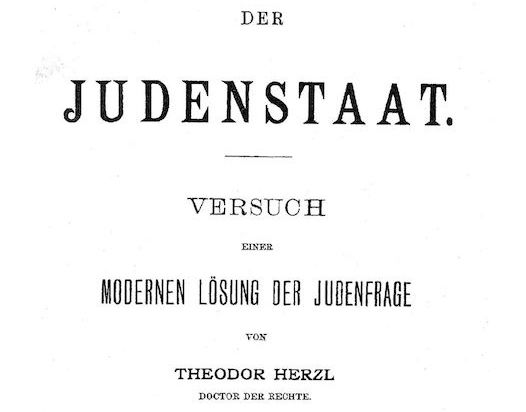
1917: The British government adopted the Zionist goal with the Balfour Declaration which views with favor the creation of "a national home for the Jewish people."
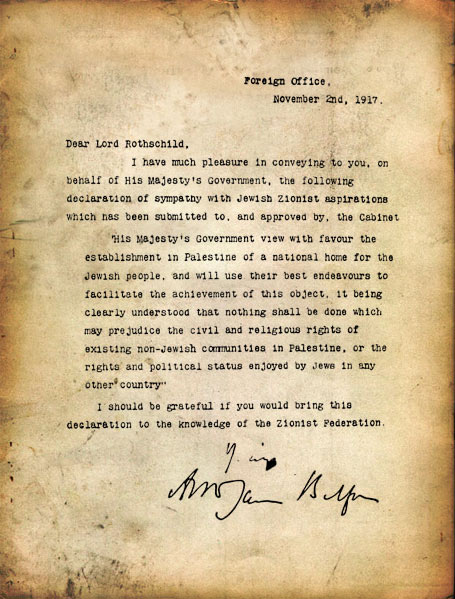
Balfour Declaration
Feb. 1920: Winston Churchill: "there should be created in our own lifetime by the banks of the Jordan a Jewish State."
Apr. 1920: The governments of Britain, France, Italy, and Japan endorsed the British mandate for Palestine and also the Balfour Declaration at the San Remo conference:
The Mandatory will be responsible for putting into effect the declaration originally made on November 8, 1917, by the British Government, and adopted by the other Allied Powers, in favour of the establishment in Palestine of a national home for the Jewish people.
July 1922: The League of Nations further confirmed the British Mandate and the Balfour Declaration.
1937: Lloyd George, British prime minister when the Balfour Declaration was issued, clarified that its purpose was the establishment of a Jewish state:
it was contemplated that, when the time arrived for according representative institutions to Palestine, if the Jews had meanwhile responded to the opportunities afforded them ... by the idea of a national home, and had become a definite majority of the inhabitants, then Palestine would thus become a Jewish commonwealth.
July 1937: The Peel Commission:
- "if the experiment of establishing a Jewish National Home succeeded and a sufficient number of Jews went to Palestine, the National Home might develop in course of time into a Jewish State."
- The Commission recommended the partition of Mandatory Palestine in part because "Partition enables the Jews in the fullest sense to call their National Home their own; for it converts it into a Jewish State."
June 1939: Jan Smuts, a member of the Imperial War Cabinet when the Balfour Declaration was published, said of Palestine that he could see "in generations to come a great Jewish state rising there once more."
May 11, 1942: The Extraordinary Zionist Conference held at the Biltmore Hotel in New York City issued an influential joint statement known as the Biltmore Program. It went beyond prior circumlocutions to demand that "Palestine be established as a Jewish Commonwealth."
Nov. 29, 1947: U.N. General Assembly resolution 181, the one partitioning the British Mandate of Palestine into two, uses the term Jewish state 27 times in its text and 3 times in the footnotes. For example:
Independent Arab and Jewish States and the Special International Regime for the City of Jerusalem, set forth in Part III of this Plan, shall come into existence in Palestine two months after the evacuation of the armed forces of the mandatory Power has been completed but in any case not later than 1 October 1948.
Note that the other part of Palestine was to become an "Arab State" - not a Muslim state. Thus did the Israel's founding document divide the territory into the followers of a religion and speakers of a language.
Also in 1947: Ernest Bevin, UK foreign secretary stated that, "For the Jews, the essential point of principle is the creation of a sovereign Jewish state."
May 14, 1948: (1)The Declaration of the Establishment of the State of Israel mentions Jewish state 5 times, most importantly in the operational passage "we ... hereby declare the establishment of a Jewish state in Eretz-Israel, to be known as the State of Israel." (By way of background, proposed names for the new state included Jewish State, Zion, Judea, Yehuda, Ever (from "Ivri" or Hebrew), Land of Israel, and Israel; but Ben-Gurion favored Israel and that carried the day.)
(2) President Harry Truman had decided to recognize the Jewish State and requested a formal request for recognition of statehood. Because the name of this state had, just hours before the declaration of independence, not yet been decided ("Judea" and "Zion" were possibilities), the representative of the Jewish Agency in the United States, Eliahu Epstein, submitted the request to Truman without mentioning the new polity's name, using instead the United Nations' name for this territory, the "Jewish State":
I have the honor to notify you that the Jewish State has been proclaimed as an independent republic ... and that a provisional government has been charged to assume the rights and duties of government for preserving law and order within the boundaries of the Jewish State, for defending the state against external aggression, and for discharging the obligations of the Jewish State to the other nations of the world in accordance with international law. ... I have been authorized to by the provisional government of the new state to tender this message and to express the hope that your government will recognize and will welcome the Jewish State into the community of nations.
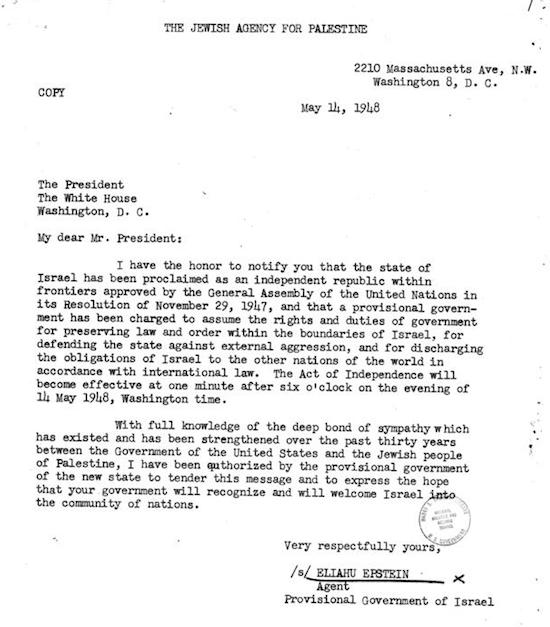
Eliahu Epstein to Harry S. Truman with attatchments re: recognition of Israel, May 14, 1948. Truman Papers, Official File. 204-D: Jewish State, 1948-49.
(3) The typed document prepared for Truman used the dummy "Jewish state" term – which the president, who had heard the new state's name by then, proceeded to scratch out in favor of Israel.
This Government has been informed that a Jewish state has been proclaimed in Palestine, and recognition has been requested by the provisional Government thereof. The United States recognizes the provision government as the de facto authority of the new State of Israel.
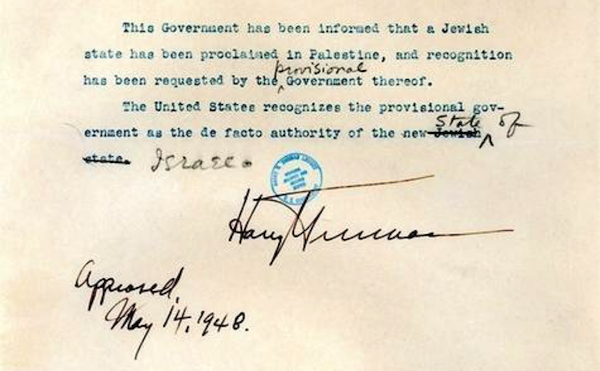
Truman response recognizing the new State of Israel
Comments: (1) Israel's being a "Jewish state" is not just a recent whim but the legal reason for this polity coming into existence. It has become contentious lately because Israel's enemies have figured they can accept Israel but really mean by it Palestine. So the Israelis have added the Jewish state element as part of the mix.
(2) Until about 2006, the concept of Jewish state was discussed mainly among thinkers about the nature of Israel and how it lives up to Jewish ideals. For example, see two essays by Daniel J. Elazar, "Israel as a Jewish State" (1990) and "Jewish Values in the Jewish State" (1996).

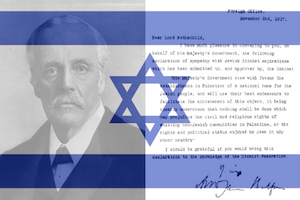
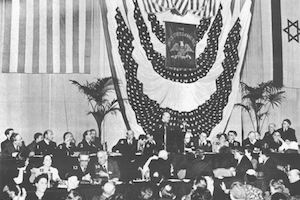
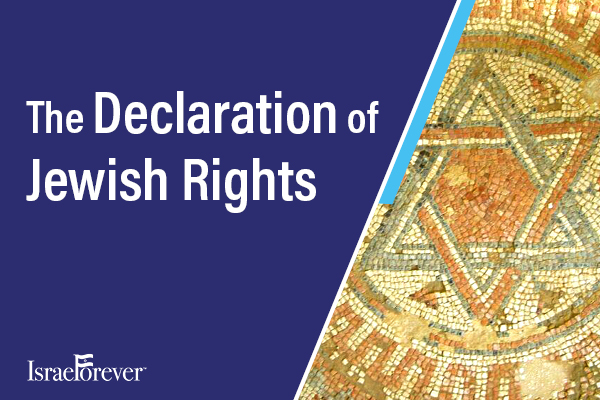
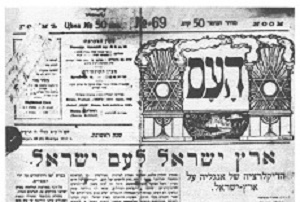
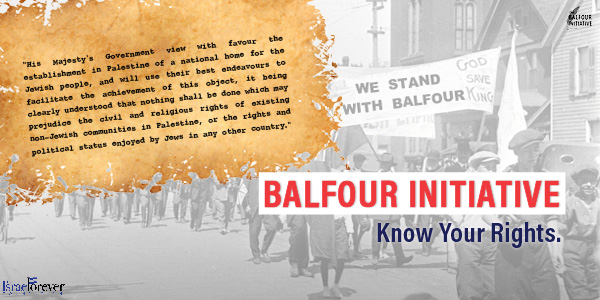



Leave a Comment on Israel Forever